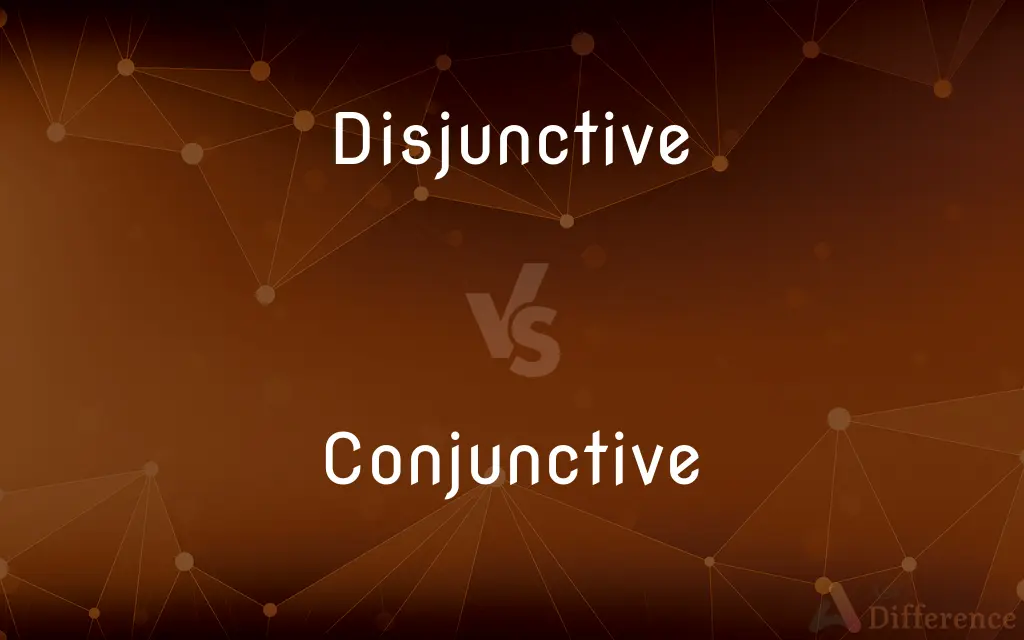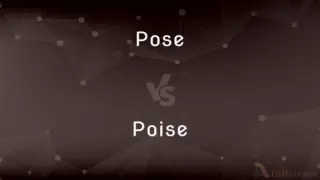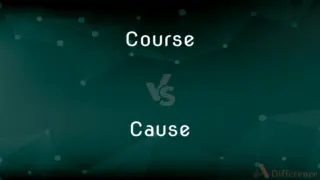Disjunctive vs. Conjunctive — What's the Difference?
By Tayyaba Rehman — Updated on September 27, 2023
Disjunctive relates to separation and denotes an "either/or" condition; Conjunctive implies connection, representing an "and" relation between statements.

Difference Between Disjunctive and Conjunctive
Table of Contents
ADVERTISEMENT
Key Differences
Disjunctive and Conjunctive play crucial roles in logical and grammatical constructions in English, serving opposing functions. Disjunctive signifies a relation of separation or alternative between words, phrases, or clauses, often implying an "either/or" condition. It highlights exclusivity and mutual exclusiveness, allowing for distinct possibilities but not simultaneous occurrences. Conjunctive, in contrast, denotes a relation of connection or combination, typically representing an "and" relation between statements, suggesting inclusivity and coexistence of conditions or elements, reflecting cohesion and aggregation.
The utilization of disjunctive elements is essential when presenting alternatives or mutually exclusive options, providing clarity and distinction in choices or possibilities. For example, in logical propositions, disjunctive relations enable the expression of distinct scenarios or conditions, allowing for a clear understanding of separate and exclusive options. On the contrary, conjunctive elements are indispensable when indicating connection or combination of statements or conditions, ensuring coherence and unified representation of ideas or elements, which is critical for expressing coexisting conditions or unified concepts.
In syntactic constructions, disjunctive relations are articulated through coordinating conjunctions like "or," symbolizing alternatives and presenting options that are mutually exclusive. It accentuates separation and distinction, facilitating precise expression of varying possibilities. Conversely, conjunctive relations are manifested through conjunctions like "and," symbolizing addition and connection, fostering the expression of cohesive and comprehensive statements, emphasizing unity and conjunction of different elements or conditions.
In essence, while disjunctive elements focus on representing separation, distinction, and exclusivity, conjunctive elements emphasize connection, cohesion, and inclusivity. Disjunctive structures are pivotal for delineating alternatives and separations, while conjunctive structures are crucial for illustrating combinations and connections, both contributing significantly to the richness and precision of language expression.
Comparison Chart
Definition
Represents separation or alternative between elements.
Denotes connection or combination between elements.
ADVERTISEMENT
Implication
Implies an "either/or" condition, highlighting exclusivity.
Represents an "and" relation, suggesting inclusivity.
Function in Construction
Used to present alternatives or mutually exclusive options.
Used to indicate connection or combination of statements or conditions.
Syntactic Articulation
Articulated through coordinating conjunctions like "or."
Manifested through conjunctions like "and."
Focus
Focuses on representing separation, distinction, and exclusivity.
Emphasizes connection, cohesion, and inclusivity.
Compare with Definitions
Disjunctive
Disjunctive focuses on representing separation, distinction, and exclusivity.
A disjunctive choice necessitates picking one among the available alternatives.
Conjunctive
Conjunctive represents an "and" relation, emphasizing inclusivity and cohesion.
In a conjunctive proposition, all conditions must coexist.
Disjunctive
Disjunctive denotes a relation of separation or alternative between elements.
The statement is disjunctive, presenting two exclusive options.
Conjunctive
Conjunctive emphasizes connection, cohesion, and inclusivity in language structures.
Conjunctive relations are pivotal for expressing comprehensive and unified concepts.
Disjunctive
Disjunctive is articulated through coordinating conjunctions like "or."
Use disjunctive conjunctions to present alternative options clearly.
Conjunctive
Conjunctive is essential for expressing coexisting conditions or unified concepts.
Formulating sentences with conjunctive elements ensures coherent representation of connected ideas.
Disjunctive
Lacking connection or consistency
The novel's disjunctive detail
Conjunctive
Conjunctive is manifested through conjunctions like "and."
Use conjunctive conjunctions to link related ideas cohesively.
Disjunctive
(of a conjunction) expressing a choice between two mutually exclusive possibilities, for example or in she asked if he was going or staying.
Conjunctive
Conjunctive denotes a relation of connection or combination between elements.
The statement is conjunctive, combining multiple conditions.
Disjunctive
A disjunctive conjunction or other word.
Conjunctive
Relating to or forming a connection or combination of things
The conjunctive tissue
Disjunctive
Serving to separate or divide.
Conjunctive
Of the nature of or relating to a conjunction.
Disjunctive
(Grammar) Serving to establish a relationship of contrast or opposition. The conjunction but in the phrase poor but comfortable is disjunctive.
Conjunctive
A word or expression acting as a conjunction.
Disjunctive
Of a proposition that presents two or more alternative terms.
Conjunctive
Joining; connective.
Disjunctive
Of a syllogism that contains a disjunction as one premise.
Conjunctive
Joined together; combined
The conjunctive focus of political opposition.
Disjunctive
A disjunctive conjunction.
Conjunctive
Of, relating to, or being a conjunction.
Disjunctive
Not connected; separated.
Conjunctive
Serving to connect elements of meaning and construction within sentences, as and and since, or between sentences, as therefore.
Disjunctive
Not used in immediate conjunction with the verb of which the pronoun is the subject.
Conjunctive
A connective word, especially a conjunction or conjunctive adverb.
Disjunctive
Tending to disjoin; separating.
Conjunctive
Relating to a conjunction (appearance in the sky of two astronomical objects with the same right ascension or the same ecliptical longitude).
Disjunctive
(music) Relating to disjunct tetrachords.
Conjunctive
(grammar) Relating to a conjunction (part of speech).
Disjunctive
(logic) Of or related to a disjunction.
Conjunctive
(grammar) Relating to the conjunctive mood.
Disjunctive
(logic) A disjunction.
Conjunctive
(grammar) Of a personal pronoun, used only in immediate conjunction with the verb of which the pronoun is the subject, such as French je or Irish sé
Disjunctive
(grammar) A disjunct.
Conjunctive
Subjunctive: inflected to indicate that an act or state of being is possible, contingent or hypothetical, and not a fact.
Disjunctive
Tending to disjoin; separating; disjoining.
Conjunctive
(logic) Of or relating to logical conjunction.
Disjunctive
Pertaining to disjunct tetrachords.
Conjunctive
(obsolete) Closely united.
Disjunctive
A disjunctive conjunction.
Conjunctive
(grammar) A conjunction.
Disjunctive
Serving or tending to divide or separate
Conjunctive
(logic) A conjunction.
Disjunctive
Disjunctive implies an "either/or" condition, symbolizing exclusivity.
In a disjunctive proposition, only one of the conditions can be true.
Conjunctive
Serving to unite; connecting together.
Disjunctive
Disjunctive is crucial for delineating alternatives and separations in language expression.
Constructing sentences with disjunctive relations enables precise expression of varied possibilities.
Conjunctive
Closely united.
Conjunctive
An uninflected function word that serves to conjoin words or phrases or clauses or sentences
Conjunctive
Serving or tending to connect
Conjunctive
Involving the joint activity of two or more;
The attack was met by the combined strength of two divisions
Concerted action
The conjunct influence of fire and strong dring
The conjunctive focus of political opposition
A cooperative effort
A united effort
Joint military activities
Common Curiosities
Is a disjunctive relation articulated through the coordinating conjunction "or"?
Yes, disjunctive relations are often articulated through the coordinating conjunction "or," presenting alternatives or mutually exclusive options.
Does conjunctive focus on cohesion and inclusivity in language structures?
Indeed, conjunctive emphasizes connection, cohesion, and inclusivity, fostering coherent and unified expression of ideas or elements.
Is conjunctive used to indicate connection or combination between elements or statements?
Absolutely, conjunctive denotes a relation of connection or combination, representing an "and" relation between elements or statements.
Is conjunctive represented by the conjunction "and," symbolizing addition and connection?
Yes, conjunctive relations are typically represented by the conjunction "and," symbolizing addition, connection, and coexistence of conditions or elements.
Is disjunctive crucial for expressing distinct scenarios or conditions in logical propositions?
Yes, disjunctive is pivotal for expressing distinct and mutually exclusive scenarios or conditions, providing clarity and precision in logical propositions.
Does disjunctive represent separation or alternative between elements in a sentence?
Yes, disjunctive denotes a relation of separation or alternative between elements, typically implying an "either/or" condition.
Is the primary function of conjunctive elements to ensure coherence and unified representation of ideas?
Exactly, conjunctive elements are essential for indicating connection or combination of statements or conditions, ensuring coherent and unified representation of ideas.
Does conjunctive facilitate the expression of cohesive and comprehensive statements in syntactic constructions?
Indeed, conjunctive facilitates the articulation of cohesive and comprehensive statements, emphasizing unity and conjunction of different elements or conditions.
Can disjunctive be used to provide clear understanding of separate and exclusive options in propositions?
Absolutely, disjunctive relations enable clear and precise expression of separate and exclusive options or conditions in propositions.
Does disjunctive imply mutual exclusiveness and allow for distinct possibilities but not simultaneous occurrences?
Correct, disjunctive implies mutual exclusiveness and distinct possibilities, allowing for separate and exclusive options but not coexistence of conditions.
Is the utilization of disjunctive elements essential when presenting alternatives or mutually exclusive options in language expression?
Yes, utilizing disjunctive elements is essential for delineating alternatives or mutually exclusive options, enhancing clarity and distinction in language expression.
Share Your Discovery

Previous Comparison
Pose vs. Poise
Next Comparison
Course vs. CauseAuthor Spotlight
Written by
Tayyaba RehmanTayyaba Rehman is a distinguished writer, currently serving as a primary contributor to askdifference.com. As a researcher in semantics and etymology, Tayyaba's passion for the complexity of languages and their distinctions has found a perfect home on the platform. Tayyaba delves into the intricacies of language, distinguishing between commonly confused words and phrases, thereby providing clarity for readers worldwide.















































